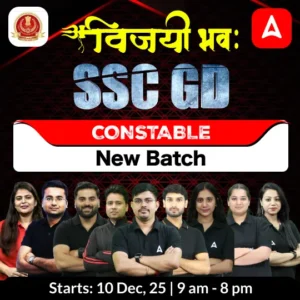In order to achieve success in the SSC CGL, we’ve decided to post ENGLISH QUIZ. Every Day, We’ll post different topics, these quizzes will help you a lot in your complete preparation for the Exam.
We wish you All the very best, PREPARE, PLAN, and EXECUTE Excellently.
Directions (1-5): Choose the option which is the antonym of the word mentioned in the question.
Q1. Invective
(a) humour
(b) primitive
(c) honour
(d) grace
Q2. Indigent
(a) crooked
(b) reserved
(c) wealthy
(d) saintly
Q3. Imperturbable
(a) stoic
(b) calm
(c) peaceful
(d) excitable
You may also like to read:
Q4. Impeach
(a) allege
(b) extradite
(c) invoke
(d) vindicate
Q5. Imminent
(a) likely
(b) probable
(c) possible
(d) remote
Directions (6-10): Pick out the most effective word from the given words to fill in the blanks to make the sentence meaningfully complete.
Q6. The only ……………. with the proposal is that it is a little expensive.
(a) Glitch
(b) Blunder
(c) Hardship
(d) Dilemma
Q7. To use a sporting ……………. middle age is like half-time at a hockey match.
(a) Device
(b) Analogy
(c) Antonym
(d) Synonym
Q8. Jaya knew that to apologize would be ……………. To admitting she had failed.
(a) Equate
(b) Assumed
(c) Tantamount
(d) Abrogate
Q9. Mr. Sharma’s shop was ……………. from all the others in the street.
(a) Indistinguishable
(b) Inalienable
(c) Akin
(d) Disreputable
Q10. There are several ……………. categories of nouns in the English language.
(a) Various
(b) Disparate
(c) Discrete
(d) Divergent
Directions (11-15): Read each sentence to find out whether there is any error in it. The error, if any will be in one part of the sentence. The letter of that part is the answer. If there is no error, the answer is d’.
Q11.
(a) If I would have been there
(b) I certainly would have
(c) taken care of the problem.
(d) No error
Q12.
(a) The reason her
(b) and her friend decided to take the bus instead of the train was that there
(c) was an announcement about cancellation of several trains
(d) No error
Q13.
(a) No sooner
(b) had he began to speak when
(c) the opposition members started shouting slogans
(d) No error
Q14.
(a) Each of the
(b) hotel’s 150 rooms were equipped
(c) with central air-conditioning and colour television
(d) No error
Q15.
(a) Every
(b) man, woman and child are now
(c) aware of the terrible consequences of the habit of smoking
(d) No error
Solutions
S1. Ans.(c)
Sol. Invective -insulting, abusive, or highly critical language.
S2. Ans.(c)
Sol. Indigent -poor; needy.
S3. Ans.(d)
Sol. Imperturbable -unable to be upset or excited; calm.
S4. Ans.(d)
Sol. Impeach -call into question the integrity or validity of (a practice)., vindicate-clear (someone) of blame or suspicion.
S5. Ans.(d)
Sol. Imminent -about to happen.
S6. Ans.(a)
Sol. Glitch -a sudden, usually temporary malfunction or fault of equipment.
S7. Ans.(b)
Sol. Analogy -a comparison between one thing and another, typically for the purpose of explanation or clarification.
S8. Ans.(c)
Sol. Tantamount-equivalent in seriousness to; virtually the same as.
S9. Ans.(a)
Sol. Indistinguishable -not able to be identified as different or distinct.
S10. Ans.(c)
Sol. Discrete -individually separate and distinct.
S11. Ans.(a)
Sol. “Had” should replace “would have” as it is conditional sentence and requires perfect tense. Therefore, the error is in part (A) of the sentence. Hence the answer is option (A).
S12. Ans.(a)
Sol. “Her” is replaced with “she” as the subject form of the personal pronoun is she, not her. Therefore, the error is in part (A) of the sentence. Hence the answer is option (A).
S13. Ans.(b)
Sol. Replace “when” by “than”, as in conjunctions expression is [No sooner + than] always. So, in part (B), when is incorrect. Hence the answer is option (B).
S14. Ans.(b)
Sol. In the sentence, part B is incorrect, “were” should replace with “was” as the singular subject (each) requires a singular verb (was). Hence the answer is option (B).
S15. Ans.(b)
Sol. A compound subject (man, woman and child) introduced by every must have a singular verb (is now;), so “are” is replaced with “is”. Hence the answer is option (B).










